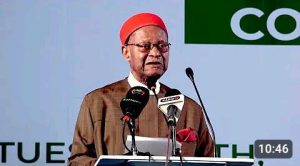
Emeka Anyaoku, a renowned elder statesman and former Secretary-General of the Commonwealth, has expressed concerns about the current state of Nigeria under President Bola Tinubu’s government.
Anyaoku argues that the 1999 Constitution, which has been amended several times, promotes an inefficient and overly centralized system.
This structure hinders national development and drains resources through excessive administrative costs.
Anyaoku criticizes the 1999 Constitution for being a product of military imposition rather than democratic consensus.
He advocates for a new constitution crafted by elected representatives of the people.
The current constitution doesn’t adequately represent the country’s diverse nature, leading to rising insecurity, widespread poverty, underdeveloped infrastructure, and hopelessness among the youth.
Anyaoku believes the present structure of 36 federating units has proven ineffective in generating national development, unlike Nigeria’s early post-independence years.
To address these issues, Anyaoku urges President Tinubu to acknowledge the urgent need for a new constitution.
The Presidency should work with the National Assembly to create a new constitution that addresses the nation’s worsening situation.
Anyaoku emphasizes the need for tangible actions to actualize a new constitution made by the people of Nigeria.
This would ensure a constitutional framework that truly represents the aspirations of the Nigerian people and accommodates the country’s plurality.
At a nonpartisan national summit organized by The Patriots and the Nigerian Political Summit Group, elder statesman Chief Emeka Anyaoku outlined critical issues plaguing Nigeria under President Bola Tinubu’s administration, emphasizing the need for a new constitution to address systemic failures.
Anyaoku highlighted the 1999 Constitution’s undemocratic origins, imposed by military decree, which he argued fosters non-inclusive governance and excessive administrative expenditure at the expense of capital development. This flawed framework, he noted, hinders Nigeria’s stability and progress as a pluralistic nation.
Anyaoku identified several pressing challenges. First, rampant insecurity, marked by daily kidnappings and killings, particularly in the Middle Belt, Northeast, and Northwest, has disrupted farming, exacerbating food insecurity. Second, Nigeria’s status as the world’s poverty capital reflects rising poverty levels and widespread suffering. Third, outdated infrastructure, especially in health and education, fails to meet modern needs. Additionally, a growing sense of hopelessness among youth and eroding national unity further compound the crisis. Anyaoku criticized the current 36 federating units as ineffective compared to the 1963 Constitution, which better supported national development.
He urged the summit, attended by leaders from diverse sociocultural groups, to propose a federal, democratic constitution crafted by elected representatives and validated through a national referendum.
Key considerations include choosing between presidential or parliamentary systems, defining federating units, and restructuring security and resource management.
Anyaoku emphasized that a robust constitution shapes effective leadership, countering arguments that leadership alone drives progress.
He thanked organizers of prior town hall meetings across Nigeria’s six geopolitical zones for contributing ideas to the summit, held from July 15-17, 2025,
in Abuja, where a draft bill for a new constitution was set to be presented to Tinubu and the National Assembly.






